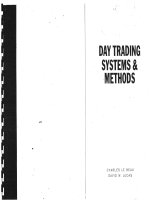John wiley sons trading systems and methods
Bạn đang xem bản rút gọn của tài liệu. Xem và tải ngay bản đầy đủ của tài liệu tại đây (33.7 MB, 354 trang )
RANDOMWALK
INTRODUCTION
1
Technical anatysis is a zmdy of patterns and movement. Its elements are normally limited
to price, volume, and open interest. It is considered tu be the study of the market itsell. The
results of technical analysis may be a short- or long-term forecast based on recurring pattrrns; however, technical methods often Limit their gods to the statement that today’sprices
are
up or down. Some systems will go as far as saying the direction is indeterminate.
Due to the rapid growth of computers, technical systems now use tools previously
reserved for fundamental analysis. Regression and cycle (seasonal) analysis are built into
must spreadsheet programs and allow these more complex studies, which were once
reserved for serious fundamental analysts, to be performed by everyone. Because they are
computerized, many technicians now consider them in their own domain. There will
always be purists on either side, rigid fundamentalists and technicians, but a great number
ofprofessionals combine the two techniques. This book draws on some of the more popular,automated fundamental trading approaches.
One advantage of technical analysis is that it is completely self-contained. The accuracy
of the data is certain. o n c of the fint great advocates of price analysis, Charles Dow, said:
The market reflects all the jobber knows about the condition of the textile trade;
all the banker knows about die money market; all that the best-informed president
knows ofhis own business. together with his knowledge of all other businesses; it
sees the general condition of transportation in a way that the president of n o single railroad can ever see; it is better informed o n crops than the farmer or even the
Department of Agriculture. In fact, the market reduces to a bloodless verdict all
knowledge bearing on finance, both domestic and foreign.
Much of the price movement reflected in commodity cash and futures markets is anticiparory; the expectations of the effects of economic developments. It is subject to change
without notice. For example. a hurricane bound for the Philippines will send sugar prices
higher, but if the storm turns off course, prices will drop back to prior levels. Major scheduled crop reports cause a multitude of professional guessing, a.hich may correctly or incorrectly move prices just before the actual report is released. By the time the public is ready
to act, the ne- is already reflected in the price.
PROFESSIONAL A N D AMATEUR
-
Beginning traders often find a system o r technique that seems extremeky simple and convenient to follow, one that they think has been overlooked by the professionals. Sometimes
they are right, but most often that method doesn’t work. Reasons for not using a techniquc
could be the inability to get a good execution, the riskheward ratio, or the number of consecutive losses that occur. Speculation is a difficult business, not onc to be taken casually
As Wyckoff said, “Most men make money in their own business and lose it in some other
fellow’s.’’
To compete with a professional speculator, you must be more accurdte in anticipating
thrnext move or in predicting prices from current news-not the article printed in today’s
newspaper (“Government Buys Beef for School Lunch Program”), which was discounted
weeks ago, and not the one on the wire servicc (“15% Fewer Soybeans and 10% More
Fishmeal’), which went into the market two days ago. You must act o n news that has not
yet been printed. To anticipate olanges, you must draw a single conclusion for the many
contingencies possible from fundamental data, or
1. Recognize recurring patterns in price movement and determine the most likely resuits of such patterns.
2. Determine the mnd of the market by isolating the bait direction of prices over a
selected time interval.
~
-
3
The bar chart, discussed in Chapter 9 (“Charting”), is the simplest representation of
the market. These patterns are the same as those recognized by Livemore on the ticker
tape. Because they are interpretive, more precise methods such as point-and-figure charting are also used, which add a level of exactness to charting. Point-and-figure charts are
popular because they offer specific trading rules and show formations similar to both b;lr
chming and ticker-tape trading.
Mathematical modeling, using traditional regression o r discrete analysis, ha become a
popular technique for anticipating price direction. Most modeling methods are modscations of developments in econometrics. basic probability. and statistical theory. They are
precise because they are based entirely o n numerical data.
The proper assessment of the price trend is critical to most commodity trading systems. Countertrend trading is just as dependent on knowing the trend as a trend-following
technique. Large sections of this book are devoted to the various ways to isolate the trend,
although it would be an injustice to leave the reader with the idea thzzt aprice trend is a
universally accepted concept. There have been many sNdies published claiming that
trends, with respect to price movement, do not exist. The most authoritative papers on this
topic are collected in Cootner, 7heRandom Cbaracter of StockMarket Prices (MIT Press);
more recent and readable discussions can often be found in The FinancialAnaIystsjournal, an excellent resource.
Personal financial management has gained an enormous number of tools during this
period of computerized expansion. The major spreadsheet providers include linear regression and correlation analysis; there is inexpensive software to perform spectral analysis
and apply advanced statistical ‘techniques; and development s o b a r e , such as TradeStation and Metastock, have provided trading platforms and greatly reduced the effort
needed to program your ideas. The professional maintains the advantage of having all of
their time to concentrate on the investment problems; however, the nonprofessional is no
longer at a disadvantage because of the tools.
RANDOMW A L K
It has been the position of many fundamental and economic analysis advocates that there
is no sequential correlation between the direction of price movement from one day to the
next.Their position is that prices will seek a level that will balance the supply-demand factors, but that this level will be reached in an unpredictable manner as prices move in an
i k g ~ ~ lresponse
ar
to the latest available information or news release.
If the random walk theory is correct, many well-defined trading methods based on
mathematics and pattern recognition will fail. The problem is not a simple one, but one
that should be resolved by each system daploper, because it will influencethe type of systematic approaches that wilLbe studied. The strongest argument against the random movement supporters is one of price anticipation. One can argue academically that all
participants (the market) know exactly where prices should move following the release of
news. However practical o r unlikely this is, it is no1 as important as market movement
based o n anticipation of further movement. For example, if the prime rate was raised twice
in two months, would you expect it to be increased in the third month? Do you think that
others will have mixed opinions, or that they assess the likelihood of another increase at
different levels (i.e., one might see a 25% chance of an increase and another see a 60%
chance). Unless the whole market view expeetations the same way, then the price will
move to reflect the majority opinion. As news alters that opinion the market will fluctuate.
Is this random movement? No. Can tbis appear similar to random movement? Yes.
Exduding anticipation, the apparent random movement of prices depends on both
the time interval and the frequency of data used. When a long time span is used, from 1 to









